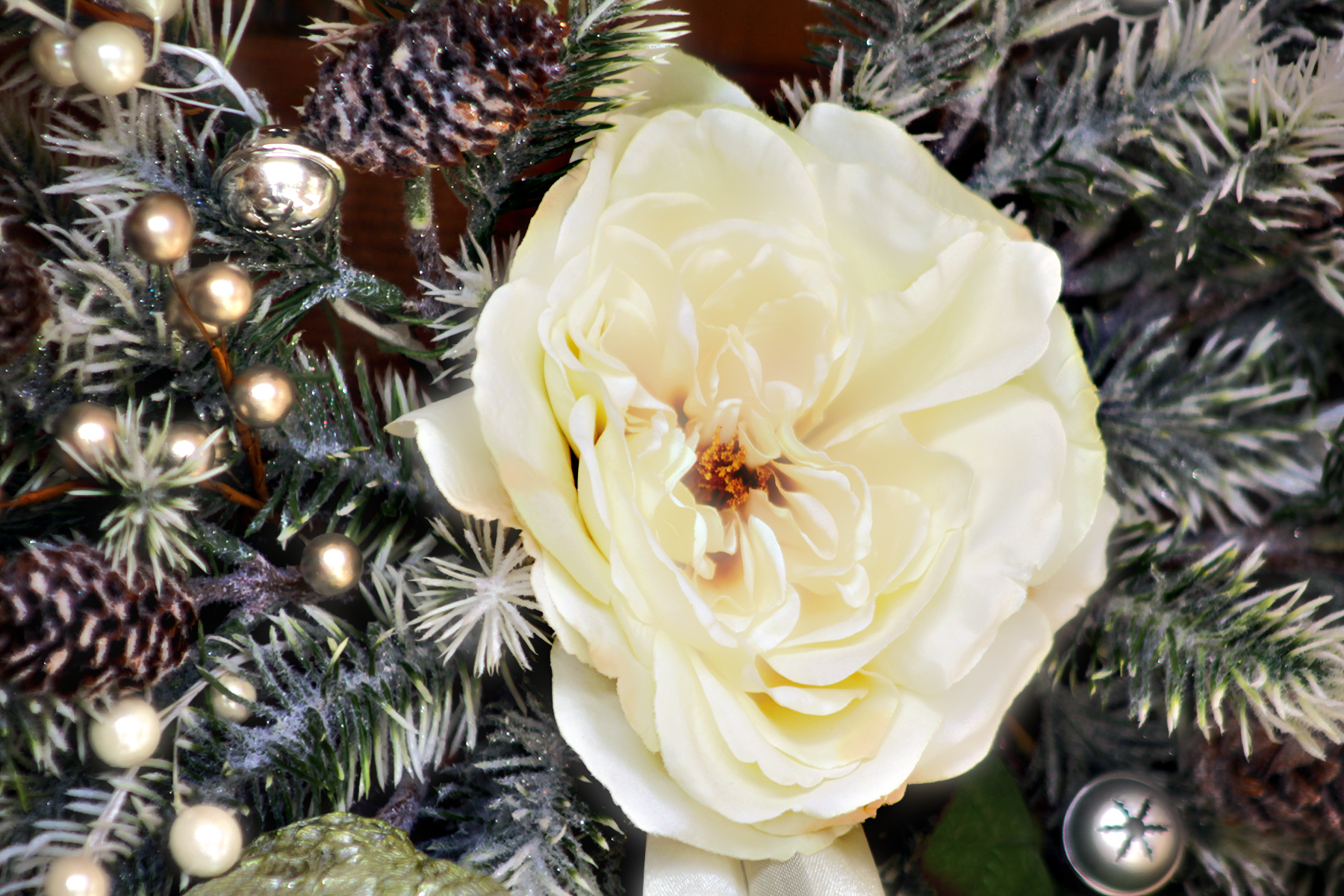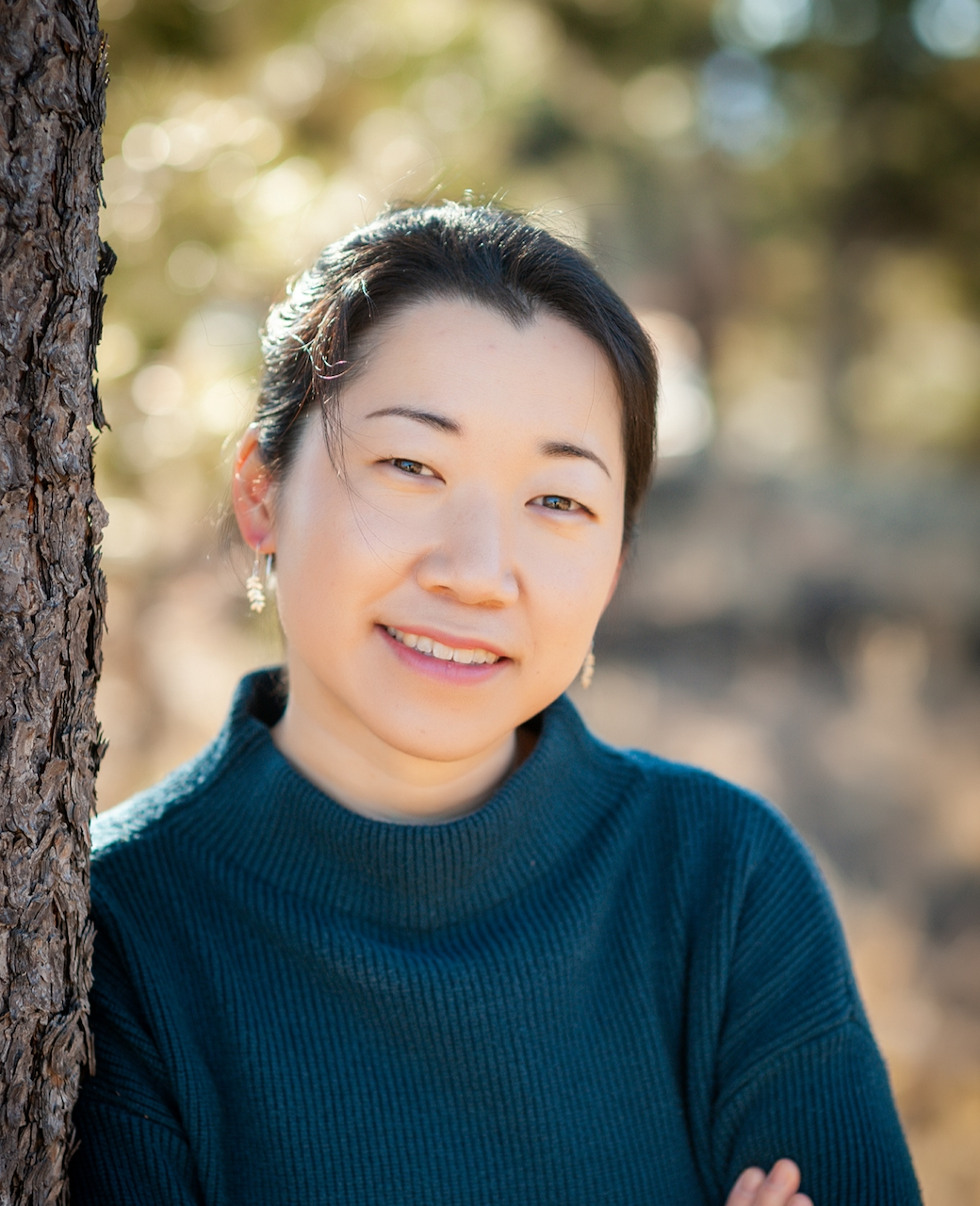Every year at Christmastide, in the heart of the ancient forest, a great sense of excitement ripples through the sheltering thickets, the nest-villages, and the small burrows.
Scurrying sounds can be heard before dawn on Christmas Day. By the time the sun casts its first rosy ribbon of light through the trees, the bears have trotted out tables and stumps and stools of all different heights, and the wood is full of movement. If there is snow on the ground, the rabbits set to work at once to clear it out of the Grand Circle with birch brooms. All of the birds — robins, thrushes, sparrows, doves, and starlings — work together to drape garlands of wintergreen berries overhead, while hedgehogs and beavers make sure each place is set with cups, plates, spoons, knives, and forks. Even the field-mice have their own settings, and tiny tureens made of hollowed-out crabapples.
Everyone else bustles about bringing in barrels and baskets and boxes of food. Each woodland animal politely keeps both eyes on his or her own task if a neighbor goes to fetch things from a secret storehouse. It is wondrous to behold the cheer and kindness in the air while these preparations are made; the forest is filled with cries of “Oh, pardon me!” and deep chuckles when minor spills turn into, well, an early first course for breakfast. Every creature has a job, but no one is in a hurry, and laughter mingles with the happy greetings of “Merry Christmas!” from every trail and cranny.
Once all the bundles have been unpacked, unwrapped, and spread upon the tables, and all the young, the lame, and the elderly ones have been gathered to their families, the feast begins.
Early sunlight splashes sideways across the tables and makes the glass pots of honey glow. (The honey, I’m told, goes particularly well with hot, toasted slices of salty goat’s-milk cheese.) Large wooden bowls of shelled nuts and sugared berries rest on the tables, while platters of roasted vegetables and pies pass from paw to paw. There are tender saplings for the white-tailed deer, stuffed mushrooms of every shade and size for the foxes, and candied crickets for the hedgehogs.
When they have all eaten their fill (and, in the case of the young ones, usually quite a bit more), they pause before the grand finale of the feast.
Fathers and mothers call their children, who squeak with elation when they realize what is coming. They want to hear the story. Half of them break into chants until, at the high table, the Old Squirrel with his silvering tail and his oak-twig cane stands.
“One Christmas, when I was a very young grayling, I awoke when it was still dark.”
At these familiar words, the wood rings with the cheers of the animals, old and young.
“I awoke to the sight of a vast white beard, cascading from a face I had never laid eyes on before. His own eyes were full of mirth, looking into our tidy hole in the sweet chestnut tree, and on his clothes was the scent of woodsmoke and new snow.
“I was struck dumb. The old legends were coming to life right in front of me, you see: Father Christmas, outside our very window! As I looked around the room, I saw that he had brought a new auger and lathe for my dad, and a new kettle and beautiful set of books for my mum.
“He wasn’t done yet, either. Out of his sack came a silver salver and a pot of hot chocolate, with bright clusters of holly berries and leaves. Ah, those smells! And the sight of that brilliant red and green against all the winter-weary white that I had known all my young life… the richness of those gifts moved me to tears, I tell you. I didn’t know why. But they were the first sip in the slaking of a long, long thirst.
“The last two packages out of his big bag were for my brother and me. My brother received soft and thick new mitts for the chestnut harvest — no such thing as trinkets and pointless gifts from him, you know — and I was handed a pair of sturdy walking sticks.
Father Christmas leaned his face close to mine. ‘There are long days of spring mud ahead, my young friend,’ he said. ‘You will learn to lift your heels as you go. But remember,’ he added with a solemn note, ‘if you wish to strengthen your legs and forge the path before you, there will be times that require a firm planting of both feet, too.’ With that, he nodded his head merrily to all of us, and strode to his sledge. ‘Long live the true King!’ he called, and my heart leapt at the words. Ah, I’ll never forget that moment.
“After he left, we were like creatures in a wonderful dream. We darted to the doors of our neighbors and spread our bounty for a feast like this one, at the very edge of sunrise. The plates were laid, the wine and the pressed apple cider poured, the holly strewn along the table. I had never heard so much laughter in my life. But —
“She was upon us before we knew it.
“The food and drink turned to gravel in my stomach as the Witch Queen approached our table. And when she demanded to know where we had gotten our gifts, my heart thudded in my ears.
“I heard the shaking voice of Brother Fox say, ‘F-F-F-Father Christmas,” and I remember her rage.
“‘He has not been here! He cannot have been here! How dare you—but no. Say you have been lying and you shall even now be forgiven.’
“And then, friends, I could hear no more. ‘Long live the true King!’ was ringing through my head like a chorus of runaway bells, and I knew I could not keep it in. If Father Christmas had broken through our winter, the true King could not be long behind. So I shouted —”
And here the Old Squirrel steps back from the table as the children in the crowd cry, “He has—he has—he has!” The noise is tremendous, and it always takes the better part of five minutes for the exultant banging of spoons upon the tabletops to die down.
“Yes,” the Old Squirrel continues. “She raised her arm then, and we knew she would turn us into stone. I had always been a timid lad. But there are times when one must, in the hard face of evil, simply dig one’s heels in and stand firm. There are things worse than death, you know, and even stones could cry out a truth and a gladness deeper than all of her wreck and ruin. Our King lives! What can stop him? In His realm there is no winter, however long, that will not end.
“And that was my last thought before I froze into grayness, and I knew nothing.
“The next face I saw — was his. I felt the golden warmth of his breath spread through my stiff limbs. And when I looked into his eyes I knew at once: he will never forget anyone who refuses to be ashamed of him.”
Here the Old Squirrel rests one paw on his cane, which is fashioned out of a certain weather-beaten walking stick, and with the other, raises a glass of spiced mead. “Long live the true King, who has come, is come, and shall come!”
And the wood rings with the forest tribes’ deep and high and musical echo: “He has — He is — He shall!”
Whereupon they rouse to cheer and revel and dance before the final course of a resplendent plum pudding, looking to a better day when, if the legends are true, the King himself shall return indeed, and we will all wake to the dawn of an unending celebration.
Author Amy Baik Lee wrote “The Christmas Tradition of the Old Woodlands” as an offering for the Anselm Society’s 2019 “A Narnian Christmas” event, which she generously shares here with Cultivating.
The featured image titled “Christmas Rose for Telling” is (c) Lancia E. Smith and is used with her glad permission for Cultivating and The Cultivating Project.
Amy Baik Lee is a contributing writer for Cultivating Magazine and the Rabbit Room, a literary member of the Anselm Society Arts Guild, and the author of This Homeward Ache. A lifelong appreciator of stories, she holds an MA in English literature from the University of Virginia and still “does voices” when she reads aloud. She writes at a desk that looks out on a small cottage garden in Colorado, usually surrounded by her husband’s woodworking projects, her two daughters’ creative works, and patient cups of rooibos tea.
Leave a Reply
A Field Guide to Cultivating ~ Essentials to Cultivating a Whole Life, Rooted in Christ, and Flourishing in Fellowship
Enjoy our gift to you as our Welcome to Cultivating! Discover the purpose of The Cultivating Project, and how you might find a "What, you too?" experience here with this fellowship of makers!


Oh my goodness, Amy. What a delightful gift this story was–it brought tears to my eyes. Thank you!
Thank you, Amy. For writing this story, for sharing it with us, and for reading it at Kris’ Memorial Service this past August. I plan to read this at future family Christmas celebrations, when we remember those who are no longer there to celebrate with us in person.